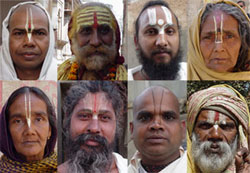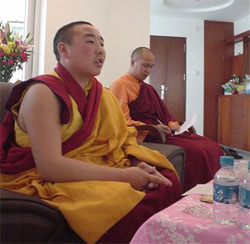Is Christianity A "Sublime Bigotry?"
10 Reflections on the Gospel and World Religions
For Sunday April 20, 2008
Lectionary Readings (Revised Common Lectionary, Year A)
Acts 7:55–60
Psalm 31:1–5, 15–16
1 Peter 2:2–10
John 14:1–14
 |
Muslim women in Bangalore. |
In our politically-correct culture, few opinions generate more hostility than ones like the words of Jesus from this week's readings: "I am the way and the truth and the life. No one comes to the Father except through me" (John 14:6). Or consider Peter's words: "There is no other name [than Jesus] under heaven given to men by which we must be saved" (Acts 4:12). Truly, Jesus is a stone that causes us to stumble and a rock of offense (1 Peter 2:8).
These uncompromising words not only provoke controversy; they raise an honest question. In his World Christian Encyclopedia (2001) David Barrett identifies 10,000 distinct religions, 150 of which have a million or more followers. Is it reasonable to believe that Jesus is the only way and that the other 9,999 religions are false?
500 years ago the French jurist Jean Bodin (1530–1596) imagined a conversation about this question in his book Colloquium of the Seven about Secrets of the Sublime: "Who can doubt that the Christian religion is the true religion or rather the only one?" asked the Christian. "Almost the whole world," responded the unbeliever.1 If almost "the whole world" doubts the claims of Peter and Jesus, what's a Christian to think?
Many people today favor some version of "pluralism"—the belief that no one religion can or should claim to be normative for all people and superior to all others. Pluralism insists on a radically egalitarian perspective that grants parity and equal validity to all religions. For example, a traditional Japanese saying suggests that despite their outward differences, all religions connect with the same divine reality—"Although the paths to the summit may differ, from the top one sees the same moon." Or in the Bhagava-Gita of Hinduism Lord Krishna proclaims, "Whatever path men travel is My path; no matter where they walk it leads to me."2
 |
Hasidic Jew in Jerusalem. |
There are two broad types of religious pluralism. A "soft" version appears in popular culture, the media, entertainment, and everyday conversations with friends. It's epitomized in the rhetorical question, "Don't all religions really teach the same thing?" A "hard" version among scholars like John Hick argues a sophisticated pluralist position in historical, philosophical, and religious treatments of the subject. Both the popular and scholarly versions of religious pluralism dismiss the words of Peter and Jesus as (1) morally repugnant, (2) intellectually untenable, and (3) politically disastrous. John Hick speaks for many people when he writes of traditional Christian views that "only diehards who are blinded by dogmatic spectacles can persist in such a sublime bigotry."
Radical religious pluralism sounds and feels good, and across the years I've always wanted to believe it. But I can't, because I don't think it's true. To me it's like the beer commerical: "tastes great, less filling." Instead, I've come to a number of conclusions that, although they don't "solve" the problem, guide my thinking.
1. Some religious views and practices are clearly false, harmful, and even despicable. I'll never grant David Koresh religious parity with Mother Teresa. I don't think that Aztec human sacrifice and Buddhist almsgiving can expect equal allegiance. Hindu widow-burning, female infanticide, phallic worship (Egypt, Assyria, Greece, Rome, India, Japan, Native American), and the mass suicide of 913 people at Jim Jones' "People's Temple" in northern Guyana all strike me as badly wrong. So, pluralism that consistently treats all religions as equally valid comes at the unacceptably high price of endorsing the diabolical as well as the divine, which is a polite way of saying that, in truth, most people do not and should not believe that "all religions are true."
2. The claim that all religions teach the same thing is patently false; this is precisely what religions do not do. At a general level one can easily document broad similarities among religions, such as various renditions of the Golden Rule. But when you examine the historical and theological particulars of religions you discover drastic differences. Judaism, Christianity and Islam are all famous for their "radical monotheism;" they all teach that their religion alone is right. But Shinto and many African traditional religions are polytheistic, Therevada Buddhism is non-theistic, and the scientific materialism of a Richard Dawkins is atheistic. Two corollaries follow from this simple observation. It is patronizing in the extreme to say that all religions teach the same thing, to tell a Bahai person, for example, that her beliefs are really no different than those of a Rastafarian. Further, contradictory religious claims like the ones I've just mentioned (and we could list many more) might all be false, but they cannot all be true—monotheism and polytheism, for example, cannot both be right.
 |
Hindus. |
3. Pluralism tries to solve this problem of contradictory truth claims in two ways. People like John Hick appeal to agnosticism, saying that the "Ultimately Real" (he thinks the word "God" biases the discussion) is unknown and unknowable, "forever hidden beyond the scope of human conception, language, or worship." For Hick, religions are imperfect, cultural, relative and symbolic expressions of "the Real." But if we apply his criterion to his own religious views of pluralism, how can Hick stand "outside" or "above" the discussion and claim to know the way things "really" are? Clearly, he does not think his position is just one imperfect one among others; he thinks that he's right, he wants to persuade us of that, and even convert us to his opinion. And why does Hick argue that all religions are true? Why not argue that they are all false? If the appeal to agnosticism remains consistent, you can't confidently claim to know anything about ultimate religious reality. A second strategy identifies a "common essence" in all religions, some lowest common denominator in them all, but this tends toward subjective interpretation, it stumbles upon the previous point, and it distorts how adherents understand their own religious traditions.
4. Christians need not reject everything about other religions. They acknowledge areas of both agreement and disagreement, and struggle over the latter. In most areas of human knowledge, when you encounter contradictory views you don't throw up your hands and concede, "they're both true." No, you study hard, make an informed choice, then remain open to further insight. Note, too, how this Christian view is far more tolerant and liberal than atheism, which rejects all the beliefs of every religion.
5. The conundrum of relating 10,000 religions to each other is not a "Christian" problem. It's an equal opportunity problem that confronts every religion and person. Dismissing the Christian approach as wrongheaded, which is one option, does not solve the problem or make it disappear. It awaits an alternative view from atheists, Jews, Muslims, Zoroastrians, and the 9,995 other religions that David Barrett has identified. Nor do we have infinite alternatives; we all operate with limited options. By and large, Christians do as adequate a job at addressing this thorny issue as believers from other traditions.
 |
Tibetan Buddhists. |
6. I agree with the liberal Jewish writer Michael Kinsley that it's not wrong or intolerant to try to convert other people. If you think that someone is wrong on some issue, it's entirely reasonable to try to change their mind.3 Christians should vigorously protect and promote the right of every person to hold any faith, or no faith at all, and extend to every individual and culture unfailing courtesy and kindness. We should never prohibit, hinder, manipulate, or coerce the beliefs of others. But that doesn't mean you can't conclude that someone's beliefs might be false and consequently try to persuade them of your understanding of what is true. Pluralists like Hick wrongly argue that you cannot disagree with a person and still be nice to them.
7. A rule of thumb in Bible interpretation is to understand the complex and ambiguous parts of Scripture in light of simple and straightforward passages. For Christians it is unthinkable that God will treat any person of any time, place or religion unfairly. We are unqualified optimists when it comes to the character of God. There are many things in the Bible that I don't understand, but I have absolute confidence that God will treat every person with perfect love and justice (Job 34:10).
8. Instead of discarding what you don't like in Scripture and ending up with a Bible that reflects only your own biases (as did Thomas Jefferson), Christians should hold together two broad themes. First, God desires that no person should perish, and that every person be saved and come to a knowledge of the truth (1 Timothy 2:4; 2 Peter 3:9). Christ is the atoning sacrifice not only for Christians "but for the entire cosmos" (1 John 2:2). Peter anticipates the "universal restoration of all things" (Acts 3:21). Second, Christ alone is God's ultimate means of salvation (John 14:6; Acts 4:12).
9. Exactly how the universal love of God and the particularity of Jesus fit together isn't clear. I like the view of the Oxford professor C.S. Lewis who in his book Mere Christianity wrote, "Here is another thing that used to puzzle me. Is it not frightfully unfair that this new life should be confined to people who have heard of Christ and been able to believe in Him? But the truth is God has not told us what His arrangements about the other people are. We do know that no man can be saved except through Christ; we do not know that only those who know Him can be saved through Him." This point is often invoked when appealing to the salvation of people who lived before the time of Christ, adults with severely limited cognitive abilities, babies and children who die young, and people today who have no reasonable opportunity to hear the Gospel — they can be saved by Christ even though they can't call upon Christ.
 |
Incan child sacrifice. |
10. Finally, a long time ago I quit trying to understand everything and admitted the many limitations of my knowledge. Saint Augustine advised that we should do our best to seek answers to difficult questions. Having done that, he said we should "rest patiently in unknowing." At the end of the day, it's not the parts of the Bible that I don't understand that bother me, such as the many questions about religious pluralism, but the parts that I do understand, like loving God with my whole heart and loving my neighbor as myself.
For further reflection:
* Consider the extremes of atheism (all religions are false) and pluralism (all religions are true).
* What do you make of the proliferation of 10,000 distinct religions? "All men," said Homer, "need the gods" (The Odyssey, Book III).
* What are the strengths and weaknesses of the ten-point position I have outlined?
* Why do so many people consider it wrong to try to convert others?
* What Scriptures on this issue are especially clear or unclear in your opinion?
* For a fuller treatment see my book Many Gods, Many Lords; Christianity Encounters World Religions, or Harold Netland, Encountering Religious Pluralism.
[1] Cited by Harold Netland, Encountering Religious Pluralism (Downers Grove: InterVarsity Press, 2001), p. 97.
[2] Netland, p. 212.
[3] Time Magazine, February 9, 2001, "Don't Want to Convert? Just Say No."
Image credits: (1) The Milli Gazette; (2) Sacred Sites of Israel at SacredSites.com; (3) Vaishnaya Internet News Agency; (4) American Public Media's Marketplace China Blog; and (5) The Discovery Channel.





